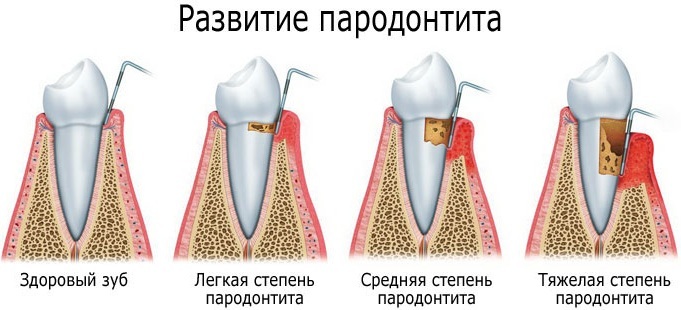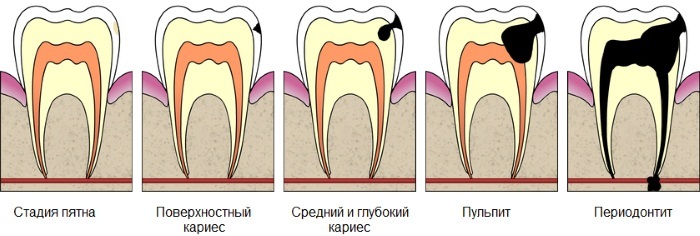Removable dentures popularly called false jaws. They are devices of various types that the patient can remove or install on their own. Prices for removable dentures depend on the material of manufacture and their design.
Record content:
- 1 What is a false jaw?
- 2 In what cases are removable prosthetics used?
- 3 Advantages
- 4 Flaws
-
5 Types of dentures
- 5.1 Complete row
- 5.2 Partial row
-
6 What material is it made of?
- 6.1 Plastic
- 6.2 Nylon
- 6.3 Silicone
- 6.4 Sintered metal
- 7 Structures and methods of fastening
- 8 Addiction to artificial teeth
- 9 Wearing and care
- 10 Repair
- 11 Cost of dentures
- 12 Denture Videos
What is a false jaw?
Dentists recommend this type of prosthetics when the patient has a loss of a large part teeth or there is no possibility of installing fixed dentures due to certain pathologies of the oral cavity.
Today, the installation of partial or complete removable dentures is a convenient solution, since fixtures are lightweight, reliable, cheaper than non-removable designs. False jaws do not require constant removal from the mouth, the installation is carried out without injury to the oral cavity.
The service of making removable full (the design includes the entire dentition and palate) and partial jaws (without palate with separate teeth) is a fairly common type prosthetics, which dentists prescribe in the absence of a large number of teeth, due to a small list of contraindications and the presence of an acceptable for any wallet cost.
In what cases are removable prosthetics used?
In cases where it is impossible to carry out fixed prosthetics, dentists recommend installing false jaws.
This recommendation applies when the following aspects are identified:
- there is multiple or complete loss of the dentition;
- if the condition of the bone tissue makes it impossible to carry out fixed prosthetics (implantation);
- the patient has a number of diseases in which fixed prosthetics are contraindicated.
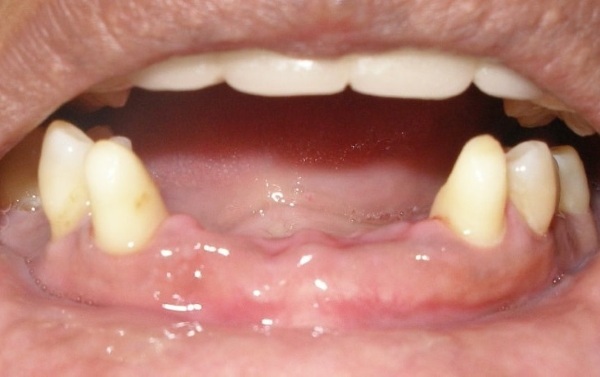
Common medical indications for installing false jaws are:
- the presence of allergies to certain types of materials of prostheses;
- epilepsy;
- the presence of multiple included, but minor defects of the teeth;
- narrowing of the jaw, which can impede speech, motor and chewing function.
Advantages
The benefits of this type of treatment include:
- restoration of chewing functions;
- full reproduction of the relief of the mucous membranes of the mouth (when using plastic);
- durability and comfort when wearing;
- with partially removable dentures, there is a slight addiction period;
- the possibility of using the patient's remaining teeth as a basis for fixing the jaw with the help of special locks that prevent the mobility of structures;
- the possibility of prosthetics of any defects of the teeth (flesh to their complete absence);
- budget cost compared to other treatments.
Flaws
False jaws (types and prices of structures are indicated later in the article) have a number of disadvantages, which include aspects:
- the need for periodic correction of the structure;
- the presence of a weaker fixation of devices in comparison with fixed prostheses;
- the likelihood of allergic reactions to plastic, acrylic;
- the inability to chew solid foods.
Types of dentures
The method of orthopedic reconstruction of the functionality of the jaws using removable devices can be divided into the following types:
- making a complete row;
- partial fragment recovery;
- conditionally plug-in method is a procedure to recreate chewing functions, used in case of loss 1-3 teeth (can be removed in rare cases or only by a dentist during hygienic procedures);
- Doctors set the time series for the period of production of a labor-intensive structure.
Complete row
A full type of prosthetics is used in cases where there are no supporting teeth. Fixation of the jaws occurs due to the process of suction of the prosthesis to the bed (adhesion) or connection with implants (it is more expensive). In appearance, this design practically does not differ from real teeth. It fulfills its aesthetic function.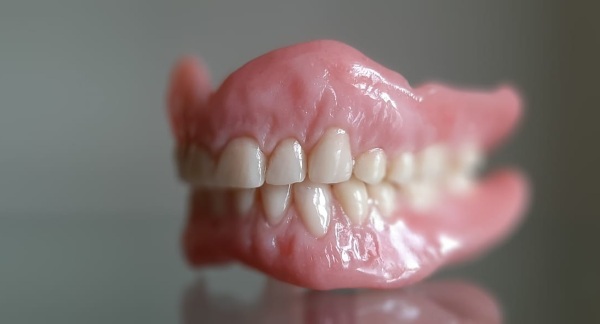
These jaws are simple and affordable fittings, and are manufactured using high quality materials to enhance the wearing comfort.
Partial row
Partial construction is a chewing technique that is used for 1-5 tooth loss. Plates with fragments of the dentition are installed on the gums using special locks attached to the bearing teeth.
A partial row can only be placed if the patient has healthy teeth.
There are several types of such devices:
- "Butterflies" are installed on clasps (assigned for temporary prosthetics of 1-2 teeth);
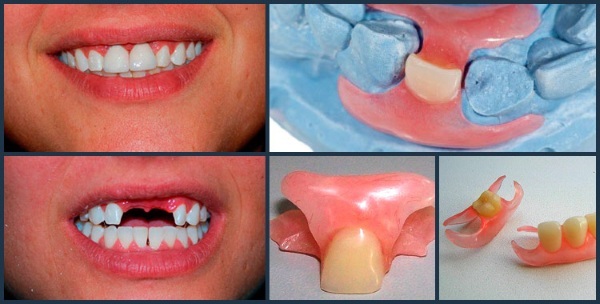
- The clasp prosthesis is a one-piece frame installed on one side of the jaw, fixed with attachments;
- lamellar rows made of plastic are suitable for 1-5 teeth loss.

Partial designs are popular because of the benefits:
- low prices;
- speed of manufacture;
- good anatomical qualities;
- simplicity of hygiene.
What material is it made of?
False jaws, the types and prices of which depend on the material of manufacture, can be made from the following raw materials:
- acrylic;
- nylon;
- silicone;
- cermets.
Plastic
Partial and complete dentitions are made of plastic. A special plastic is used to make the base of the prosthesis, into which individually ground teeth are inserted, matched to the shape and color.
Distinctive features of the material are attractive aesthetics, fastening with clasps in partial models. Full constructions are attached to the gingiva using an adhesion effect.
Moreover, the upper jaw has better fixation properties than the lower one due to the presence of a suitable anatomical structure of the gums and a pronounced vestibule of the pits in the palate. The lower jaw is distinguished by the worst fixation due to the pronounced atrophy of the alveolar processes and the absence of a favorable anatomical structure.
Nylon
Nylon prostheses are used only for partial prosthetics due to the lack of flexibility in the material of suction to the gums. The design features are considered the absence of the need to turn adjacent teeth and the perfect compatibility of the material with the teeth.
The advantages of the material include:
- good flexibility;
- high reliability;
- light weight;
- ease;
- excellent aesthetic qualities;
- wearing comfort.
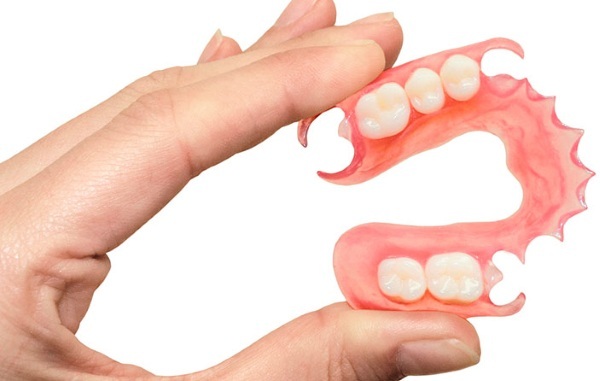
Dentists call nylon prostheses "soft" teeth or "invisible" teeth, since the base of the structure has a pink tint, is transparent, merging with the gum. The gums function as a support for fixing the structure with the help of clasp locks, invisible to others.
Silicone
The elastic silicone denture is suitable for both partial and complete dentures. The material is analogous to nylon and serves as a basis for plastic teeth.
A distinctive feature of the system is the flexibility of the base and invisible clasp fastening.
Silicone has the following qualities:
- compliance;
- softness;
- lack of allergic reactions (unlike acrylic);
- attractiveness of appearance;
- compact size;
- ease of fixation.
Negative characteristics include:
- the appearance of discomfort in the gum area, since during the manufacture of structures there is no internal support, and all the weight falls on them;
- bone atrophy due to lack of proper load.
Sintered metal
False jaws (types and prices of products depend on the design) made of metal ceramics are popular.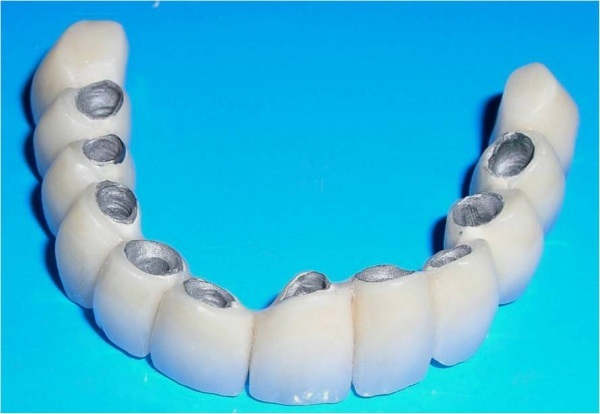
The material is characterized by:
- high cost;
- strength and reliability;
- impeccable appearance, which differs little from natural teeth, which is not lost over time;
- hypoallergenic;
- imperceptibility in the mouth.
The metal-ceramic structures include metal frames on which ceramic teeth are installed. Fastenings involve the use of special clasp locks fixed on the abutment teeth.
It is possible to insert a partial row only in the absence of gum disease (periodontal disease). Implants are contraindicated in the presence of small teeth (due to the impossibility of fixing the prosthesis), with a mixed bite, when the teeth are of different sizes.
Structures and methods of fastening
Although the people call it "false jaws with suction cups", in reality such special suction cups do not exist for complete removable dentures. The effect is created due to the manufacture of a closing valve on the structure, which forms the edges in the removable prosthesis, which go into the oral cavity.
When the device is put on the gums, it is necessary to press on it and thanks to the saliva and the structure of the structure, a negative pressure valve is formed, which holds the jaw, like on suction cups.
To increase the reliability of fixation of the prosthesis, you can use a number of fixing creams, gels, which are produced by the pharmaceutical industry. A small amount of cream or gel must be applied evenly inside the denture.
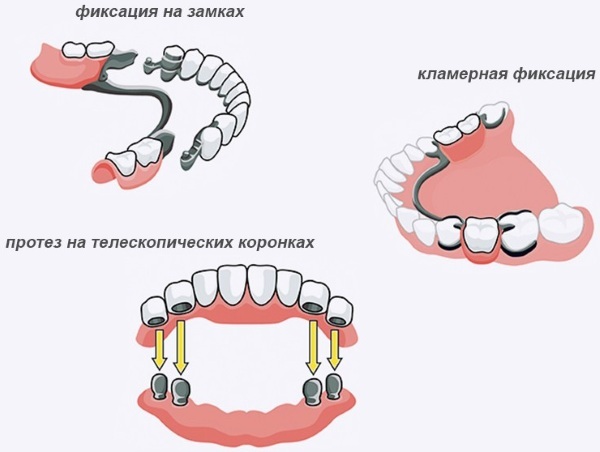
Thus, it will be securely attached to the gums within 24 hours. The advantage of using special products is that food remains do not penetrate under the jaw while eating.
Clasp locks used in partial prosthetics are installed on the abutment teeth, forming an arc with the base of the device that reliably fixes the row. Attachments are also used for partial prosthetics, they perform the functions of a lock or hinge fastening, they are distinguished by a high level of hygiene and cost compared to clasps.
Addiction to artificial teeth
The process of adaptation to removable dentures is difficult and time-consuming.
Several factors affect the duration of addiction:
- the size of the structure;
- measure of attachment to the jaw;
- chewing pressure value;
- the response of the gums and bone tissue to the prosthesis;
- the general reaction of the body, which depends on age data, the state of health and nervous activity of the patient.
At first, the following uncomfortable sensations may appear:
- increased salivation;
- inability to coordinate chewing movements;
- indistinct diction;
- sometimes there is nausea and urge to vomit.
Often in a person, the first reaction to negative effects discourages the desire to wear artificial teeth. However, experts recommend to be patient, to be distracted by interesting topics, pleasant thoughts, as over time addiction will appear. According to statistics, the process of implantation of partial dentures can take from 7 to 30 days, for a full denture - up to 6 months.
Wearing and care
The price for false jaws depends on their type. Maintenance of the structure is necessary to extend its service life.
To do this, you need to follow a number of rules:
- After each meal, the denture should be removed from the cavity and rinsed under running water.
- Cleaning of the devices is carried out with a soft toothbrush and finely dispersed paste (you can use it for children) 2 times a day. For convenience and ease of cleaning, you can use special solutions, tablets that dissolve in water, and the dentition is lowered into it for 20-30 minutes.
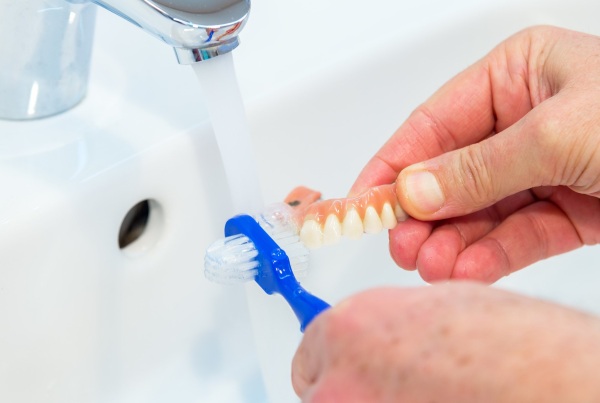
- Modern devices made from high quality materials do not need to be cleaned and removed daily. However, if the denture is removed at night, it must be stored in a special solution or clean water.
- Over time, dental calculus is deposited on the false jaws, as well as on natural ones, so it is recommended to professionally clean them periodically every six months by the dentist.
Repair
No matter how well the prosthesis is made, the time always comes for it to break.
The causes of malfunctions are often:
- exaggeration of the permissible load on the structure;
- the prosthesis is made with marriage;
- loss of a bearing tooth;
- lack of consistency between teeth and prosthesis;
- with improper care;
- breakage as a result of a fall;
- expiration of service life.
The main faults are dents and fractures of the base, chipping of parts. Restoration of prostheses usually takes 1 day. However, if there are difficult faults, repairs may take longer.
The work must be performed by highly qualified specialists - dental technicians. When gluing the product, special resins are used to ensure the integrity of the fixture.
Cost of dentures
The cost of false jaws depends on their type, material of manufacture. Approximate prices are summarized in the table.
| Type, material of manufacture of a removable denture | price, rub. |
| Complete range of plastic | 23000-42000 |
| Partial row made of plastic | 19000- 22000 |
| Partial row in nylon | 15000-40000 |
| Clasp clasp | 40000-46000 |
| Full range of silicone | 44000-55000 |
| Partial row of acrylic (5-13 teeth) | 25000 |
| Full row of acrylic | 25000-35000 |
| Metal-ceramic crown (1 tooth) | 14000-36000 |
| Partial row made of silicone | 20000 |
The notorious false jaws in a glass are yesterday. Today dentistry offers the latest types of prostheses that look natural and do not create difficulties in wearing, do not require frequent removal. Due to its affordable price, the removable prosthetics method is in demand among patients.
Denture Videos
How to choose dentures:

